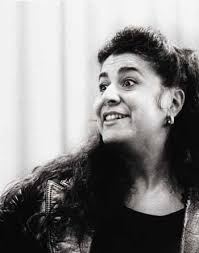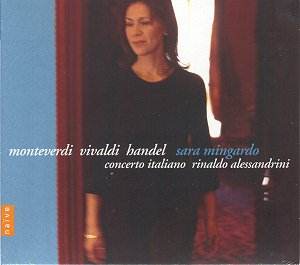 Today's Guardian has an interview with Cecilia Bartoli to plug her new album. The author makes a point about her fondness for 18th century composers and tries to get her to acknowledge she's afraid of the 19th-century opera repertoire and to answer critics who say she'll never be a true diva until she goes mainstream. She'll have none of it. She loves the baroque and observes that her audiences come to her, and bountifully so, to hear what she wants them to appreciate and learn to love. The article is The last diva by Stephen Moss. The lead in reads: "Cecilia Bartoli is feted as operatic royalty. But why does she insist on such an obscure repertoire?" The new CD is Opera Proibita (Forbidden Opera), a collection of arias by Handel, Alessandro Scarlatti and Antonio Caldara from the first decade of the 18th century, "when," as Moss says, "the Catholic church in Rome clamped down on opera and composers cleverly circumvented the restrictions by stretching the boundaries of oratorio instead."
Today's Guardian has an interview with Cecilia Bartoli to plug her new album. The author makes a point about her fondness for 18th century composers and tries to get her to acknowledge she's afraid of the 19th-century opera repertoire and to answer critics who say she'll never be a true diva until she goes mainstream. She'll have none of it. She loves the baroque and observes that her audiences come to her, and bountifully so, to hear what she wants them to appreciate and learn to love. The article is The last diva by Stephen Moss. The lead in reads: "Cecilia Bartoli is feted as operatic royalty. But why does she insist on such an obscure repertoire?" The new CD is Opera Proibita (Forbidden Opera), a collection of arias by Handel, Alessandro Scarlatti and Antonio Caldara from the first decade of the 18th century, "when," as Moss says, "the Catholic church in Rome clamped down on opera and composers cleverly circumvented the restrictions by stretching the boundaries of oratorio instead." more extracts from the article:
"I love the baroque period," she says. "It's not just the music; I like baroque painting, baroque architecture. I like the structure of baroque music - it gives you a lot of freedom of interpretation. It's very rhythmic and you have this contrast between rhythm and simple melodies. Two years ago, I did [Handel's] Il Trionfo del Tempo e del Disinganno with Marc Minkowski in Zurich, and I was fascinated and overwhelmed by its beauty." Working with her pet musicologist (and former boyfriend) Claudio Osele, she found out more about the period in which the oratorio was written and the tensions of early 18th-century Rome. Forbidden Opera is the result of their labours.
Bartoli likes to initiate her own projects, but how do Decca feel about her more unusual choices? "When I suggested a Vivaldi disc [in the late 90s], it was difficult to convince them to do it. But it was enormously successful and I proved that there was an audience ready to discover it. I like to present a project which has both a commercial and a cultural element. I try to combine them.... I have to bring people to this baroque project. This is the goal. "











I listen to quite a bit of 18th century music. Among vocalists, I like the countertenors, David Daniels, Andreas Scholl, and Paul Esswood. I lose track of the sopranos & mezzos. I think my favorites are Bartoli, Elly Ameling, and Edith Baker. I've lately discovered the alto/contralto Sara Mingardo:
Arias, madrigals, & cantatas by Monteverdi, Vivaldi, Handel, Carissimi, Cavalli, Legrenzi, Merula, & Salvatore; Sara Mingardo (alto); Monica Bacelli (mezzo-soprano, in "Vorrei baciarti"); Concerto Italiano, Rinaldo Alessandrini; Naïve- OP 30395(CD) reviewed here.












No comments:
Post a Comment